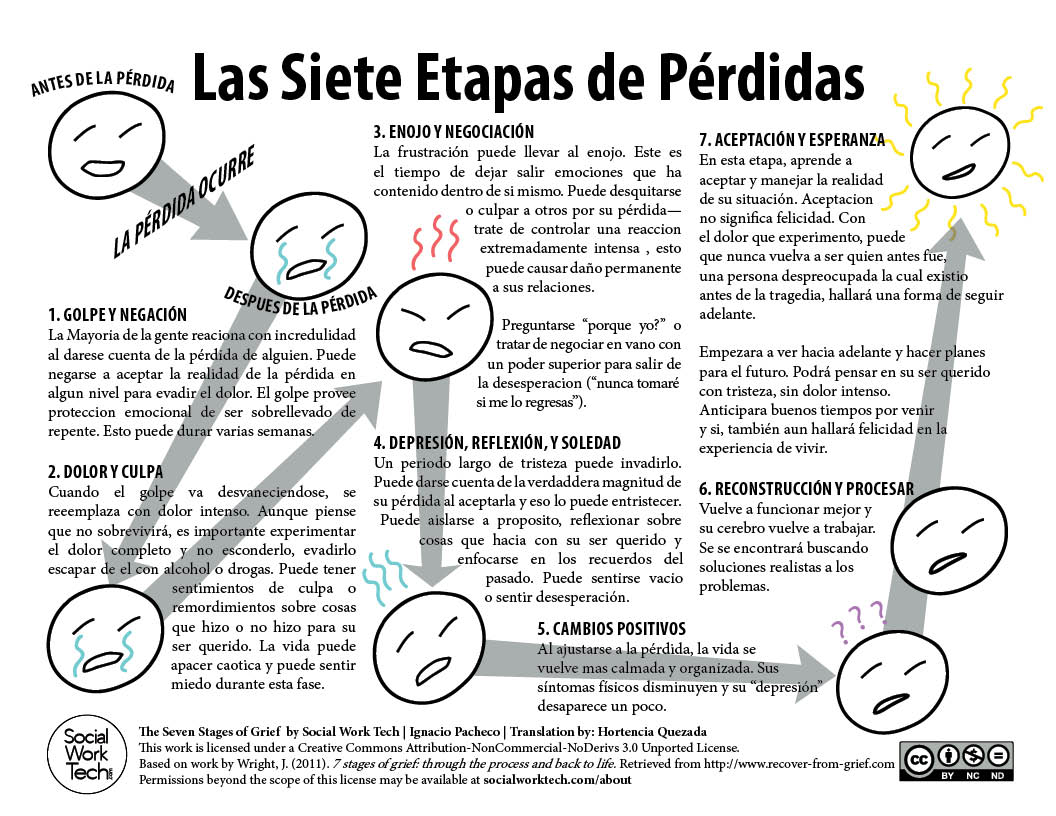I made a handout for the Seven Stages of Grief that I give to clients when dealing with loss. In serving Spanish-Speaking populations, primarily Mexican, I saw that there was a need for this intervention to be translated. I got some help with it and did my very best to translate this document in the spirit of what it was intended to do: provide an explanation for loss in a simple and non-academic way.
It should be noted that “grief” translates to “duelo”.“Pérdidas” translates into losses/bereavement, I’m more inclined to use that word… When talking with my clients, “pérdidas” is more appropriate when talking about losses of loved ones, break-ups, etc.

I want to thank Lizet B. for reaching out to me and helping my cara-de-nopal update this document with a grammatically-correct translation of this document. Thank you for empowering me and our clients 🙂









Ignacio, ¡Muchas gracias por compartir esta herramienta! Tengo algunas correcciones que sugerir:
• Stages of grief translates into Etapas del duelo
• Under number one start the sentence with La, under the same number after la realidad de la perdida add en
• Under number two second sentence, Sobrevivirá is misspelled
• Under number three. May I suggest that you begin the paragraph with something like this: La frustración puede llevar al enojo. And then Esto in the following sentence should be Este. In that same paragraph dano should be daño. In the following paragraph puede preguntar should be preguntarse. Lastly in that last sentence nunca tomaré is missing an accent on the e
• Under number four: the last sentence sentir should be sentirse and delete sentimientos de estar and follow it with o sentir desesperación.
• Under number five: second sentence: sus síntomas físicos disminuyen instead of son menos
• Under number six: second sentence, should begin: se encontrará buscando soluciones
• Under number seven: bottom of the first paragraph, una persona sin problemas could be changed to, una persona despreocupada and then in the same sentence pero allara should be hallará. In the second paragraph. First sentence, planes is misspelled. In the second sentence, it should read: podrá pensar en su ser querido. And finally in the last sentence y si, también aun hallará felicidad
De Nuevo ¡muchas gracias! por compartir tus talentos esto me será muy útil en mi trabajo con mis clientes.
Thank you! I just got thrown into facilitating a 90min grief and loss (Hi social work!) and was given and all English curriculum. This is super helfpul!!
My mother (born and raised in Mexico) says “luto” is more appropriate than “pérdidas.”
“Luto” also means grief.
Thanks for sharing this wonderful resource.
I would love to use this visual aid for my Spanish speaking patient and families. I work in a hospital with patients who have life-limiting illnesses and experience many kinds of losses. I’m wondering whether you will be updating this tool to reflect that grief does not occur in stages or in a checklist and that it is rather much more diverse depending on the individual.
I just found your website and I’m enjoying the information you provide.
If you sketch it out, I will make it. Please contact me
Grief is such a painful process. Sometimes, your feelings and pain can become overwhelming enough to affect you and your life. When this occurs, it is important that you seek the help of other people. You do not have to be alone with your feelings and pain. There will always be other people who are willing to help you cope with your grief and loss.